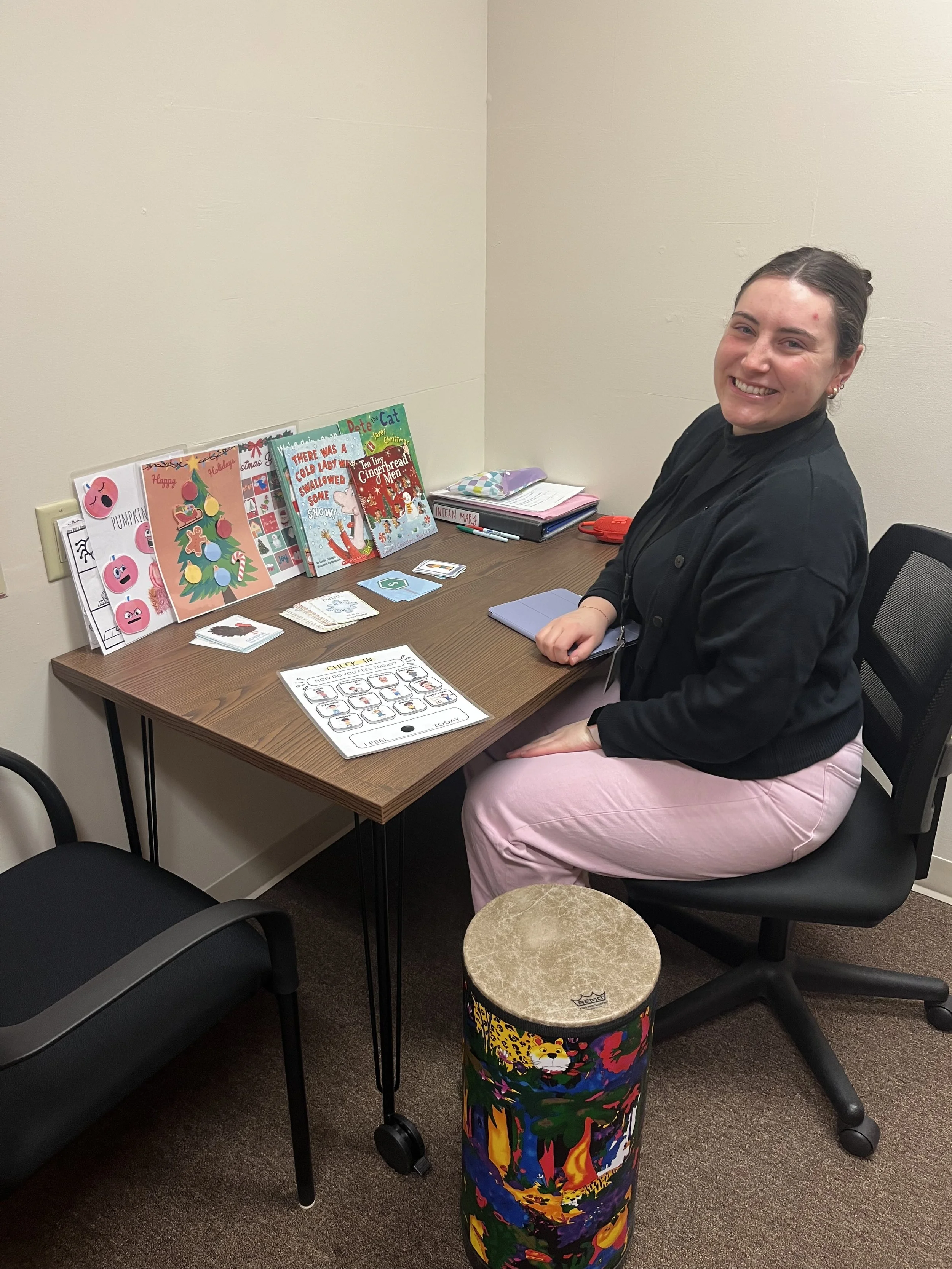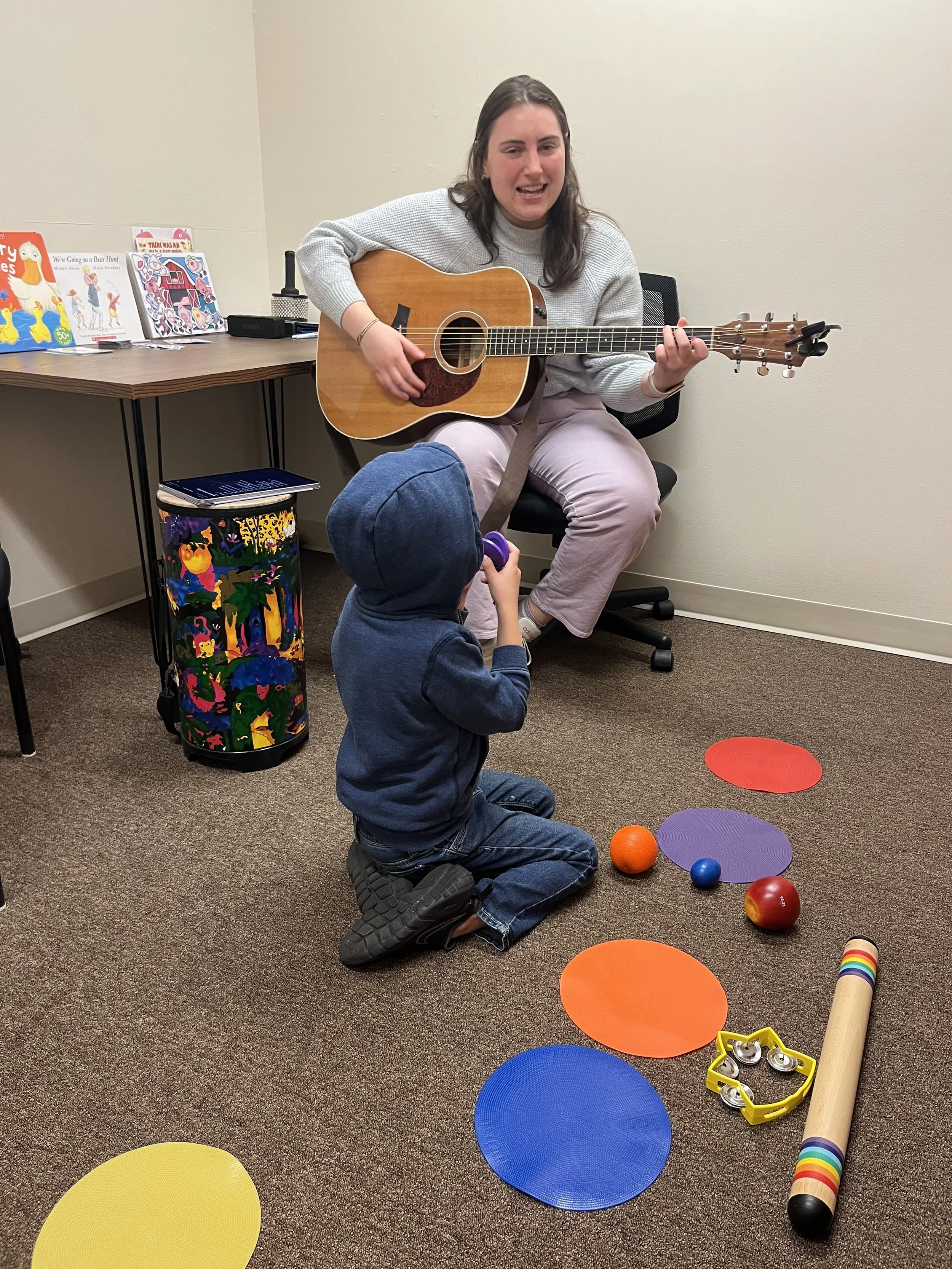Advice for the Incoming Music Therapy Intern
Our intern, Mary, will be diving into a variety of music therapy topics to increase her knowledge as her final project! She not only is gathering this information for herself, but also to share with you in the form of a blog post. Thanks for reading!
As I near the end of my internship, I have been reflecting on the lessons I've learned as well as the progress I’ve made over the past six months. I have always enjoyed mentoring others, especially within the music therapy community. I enjoy meeting new people and hearing their stories. I wanted my final blog post to offer advice based on my internship experience. If you have any questions or wish to reach out, you can find me on Instagram @missmarymusictherapy and email at maryhannamusic@gmail.com. I’d like to thank my cohort members who are also near the end of internship, Jaylee Sowders and Makayla Cripe, who helped me come up with useful ideas for this blog based on their experience as an intern.
Assignments
Sometimes, college coursework can be overwhelming. I know when I was a student, I did not always complete assignments or review material to the best of my ability. Internship can also be busy, but it provides you with more time to dive into academic assignments and fully understand what you’re learning. Take the time to read and explore the research that comes along with internship assignments and discover which topics interest you the most! These topics are important areas to recognize as you step into the professional world. In the music therapy profession, you will never stop learning and growing!
In my internship, I was tasked with completing a handful of podcast reviews, in which I listened to a music therapy-related podcast and reflected on my opinion as well as how it could apply to my practice and clients. Podcasts are something I hope I continue engaging in as a professional. Since podcasts are simple to listen to while transporting from one place to another, working on chores around the home, etc., they are an easily accessible form of education!
If possible, only work on internship-related assignments and prep during working hours. A healthy work-life balance can be difficult to prioritize, but it is important to set this schedule as an intern so you don’t find yourself burnt out as a professional.
Session Preparation
Build your toolbox repertoire for each population you’re working with! Having a handful of songs in your back pocket will help you immensely. You can plan and plan and plan for a session, and it may never go the way you originally expect it. So much of music therapy is adapting to the in-the-moment needs and wants of the client. It’s important to be reflexible in sessions in order to best benefit all clients.
Get creative! I have found that my clients are most engaged in an intervention when it includes their preferences. This could be preferred forms of media such as movie, book, and television characters, video game sounds, and so much more.
Use your resources to your advantage. As an intern at Aspire, I have had access to the company’s interventions and have been directed to learn from other creators. While some visuals, session plans, or intervention ideas come at a cost, there are tools that exist for free! These free resources may be difficult to come across, so I have found Canva to be a great resource for creating unique interventions as well as replicating other ideas. I have always used the free version of Canva, and I have not had any issues with a lack of content or templates available to me.
Once you’ve created some helpful resources, share them with your co-workers and friends within the profession! I have found that sharing resources can be a great way to help others tap into their creativity as well as aid service-users with similar needs.
When it comes to repertoire, be gentle with yourself. Learning so many songs at once can be overwhelming, so remember to take breaks and be mindful of how you feel. While we are in a profession in which we serve others with music, it is important to nurture your own relationship with music as well.
Facilitation
Prioritize your growth as a clinician. Internship is the time to make mistakes! Try new things now! Bring in creative, unique experiences, and see what happens.
If something goes wrong or takes a turn, adapt! As I previously mentioned, you never know what could happen in a session, and it is important to be flexible and quickly switch up an intervention when needed.
Have confidence in yourself! Your experience in school may be different from your supervisors, and one of you could be more knowledgeable on a topic than the other. Take the feedback that is helpful to you and your clients.
Observations & Supervision
While observing other professionals may seem simple, one can learn a great deal from fully engaging in observations. Whether you observe a PT, OT, SLP, BCBA, MT-BC, etc., take in as much as you can, and ask questions! They are more than willing to answer any questions you may have.
Your supervisor is there to help you! Be open and honest with them so they can aid you to the best of their ability. All of your supervisors have been where you are and understand what it’s like to be an intern. I feel lucky I had the opportunity to learn from various supervisors at Aspire who were always supportive. If you feel like you are not getting the supervision you need in internship, reach out to your academic advisor as well as your internship director for assistance. It may feel awkward, but sharing that you feel a lack of support will make them more aware of this issue. They want to make sure you receive proper training and supervision, and if something does not feel best during internship, they will want to change that for you while you’re still there as opposed to afterwards. Mentorship in the field is very important, and they should be able to help you feel more comfortable and encouraged.
It may not seem like it at times, but everyone is rooting for you to develop into a trained professional. Supervisors may be hard on you at times, but it is simply because they want to see you succeed! Take any feedback you receive and incorporate it into your next session, documentation, etc. when applicable.
Support
Depending on where you are located, internship can be a lonely time. Rely on the relationships you have for support during this learning period.
Ask your internship site for social recommendations in the community! Other employees within the company may have connections or experience that could benefit you, such as a community choir, spiritual group, or exercise class! This can be a great way to immerse yourself in the community around you!
If you have a co-intern, promote a good relationship with them. As people, we will not get along perfectly with everyone. Even if your personality or work style does not relate to your co-intern’s, be friendly and kind. They may be the only other person in your shoes. You can help one another by offering social interaction, advice, intervention ideas, or just lending a listening ear. I have been lucky to have one of my good friends as my co-intern, and she has been super helpful not only as a co-intern but as a support system for me.
If you do not have a peer support system in internship, consider reaching out to school friends, cohort members, and/or family members to aid you in the internship process. While it’s a rewarding growth experience, it can be difficult at times, and a support system is necessary!
Miscellaneous
Internship can be stressful, but spend some time enjoying it! Internship is a nice middle ground between academic education and the professional world. This is your time to grow and figure out what you prefer, such as client population, work schedules, drive time, and more, as a future clinician.
You got this!
Looking for an internship?
Aspire Music Therapy is a National Roster Internship Site in Fort Wayne, Indiana. You can learn more and apply here.


